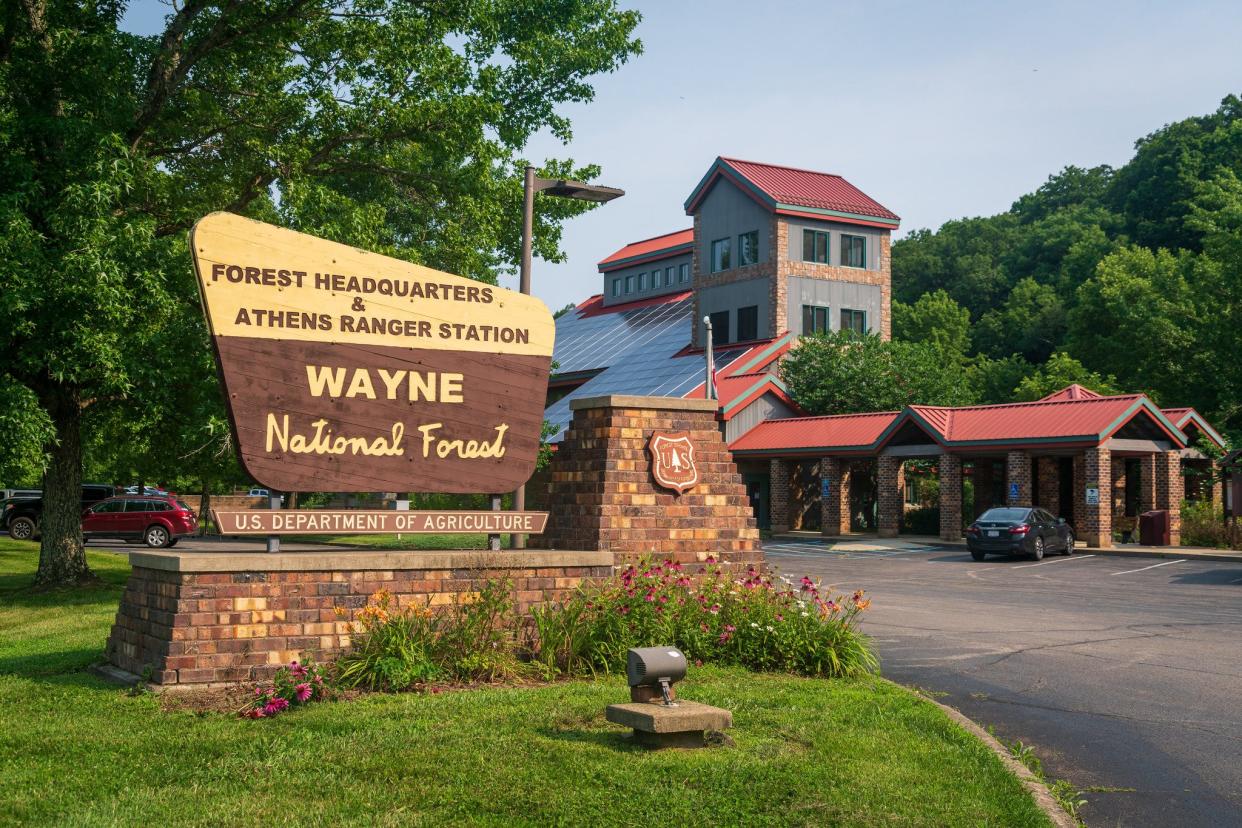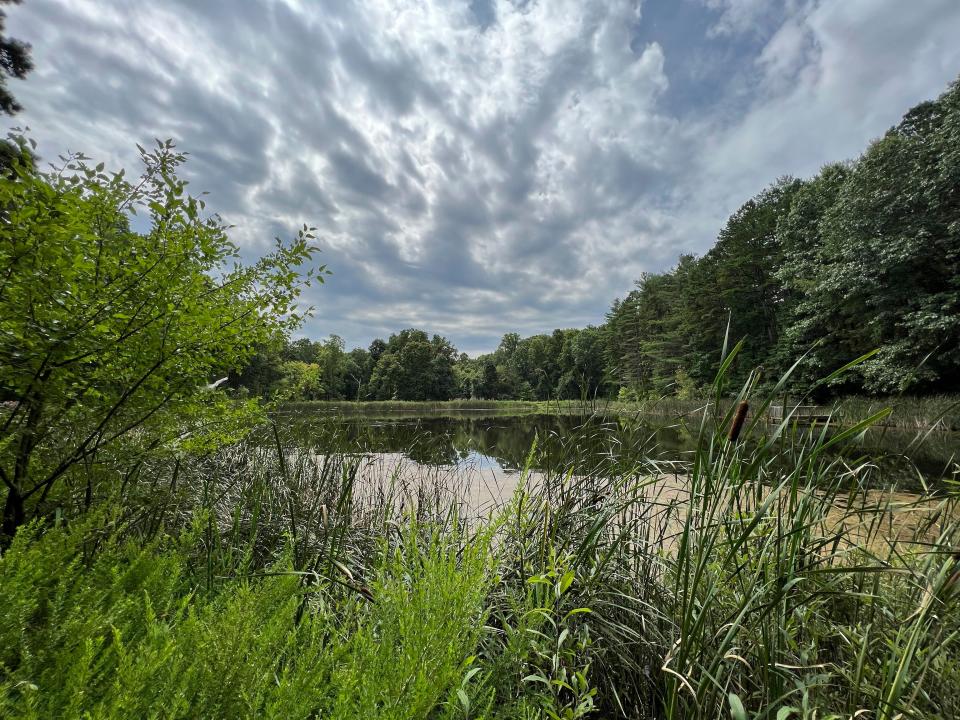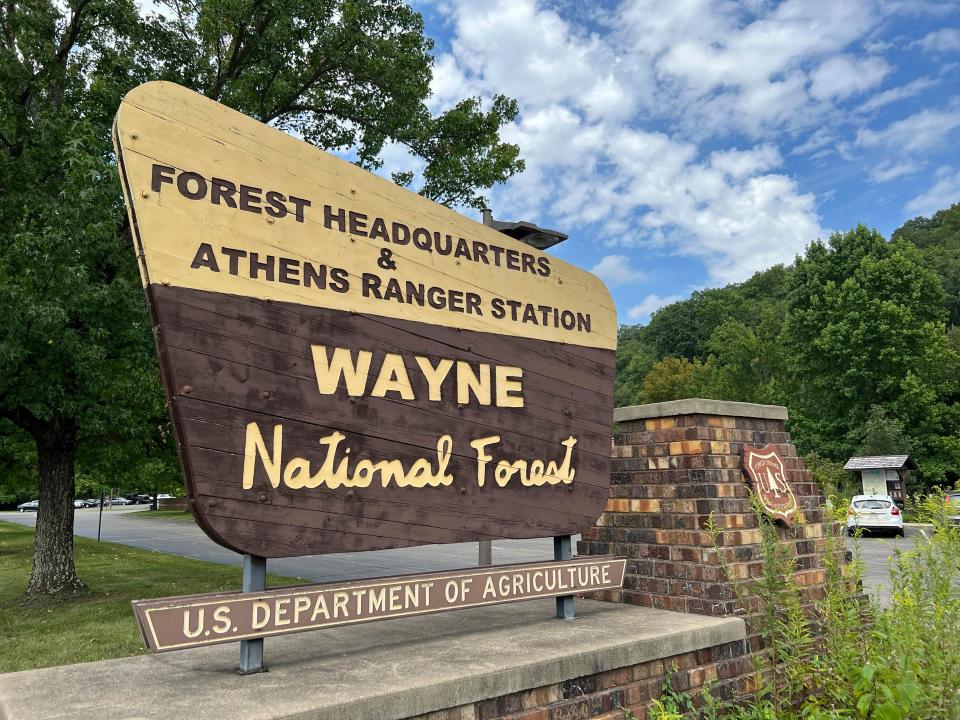'Woke National Forest': What the public said about renaming an Ohio forest

- Oops!Something went wrong.Please try again later.
When the United States Forest Service in August proposed renaming the Wayne National Forest, people flooded the agency with emails, calls, letters and texts.
The 1,100 responses during a two-week comment period showed a bitter divide in the latest battle of the nation's culture wars. The Enquirer obtained the responses through a public records request.
The federal government hasn't decided what to name the 244,000-acre forest spread across southern Ohio. U.S. Agricultural Secretary Tom Vilsack will make the decision at his discretion.
About 55% of those who responded to the Forest Service during the two-week public comment period favored the removal of the forest's namesake, Revolutionary War Maj. Gen. Anthony Wayne, known also as "Mad Anthony," an Enquirer analysis of the responses showed.
Wayne led the decisive battle in 1794 against Ohio's Native American tribes that forced them to cede their territory in Ohio and relocate west.
The Forest Service has proposed changing the name to Buckeye National Forest. Other proposals for the name change included Koteewa National Forest, after a Miami Tribe word for "fires" in homage to fire's role in forest management and regeneration.
The proposed name change follows similar debates across the country over how – or whether – to honor historical figures with problematic legacies. Confederate monuments have been torn down, school buildings and military bases renamed.
The emails obtained by The Enquirer contained the senders' names. The government redacted the email addresses and any information that identified where the senders hailed from. So The Enquirer could not ascertain how many were from Ohio residents and how many were from out of state.
Here's what the emails revealed.
Name change supporters wanted to right a wrong

Almost all who supported the name change said the country should honor American Indian tribes who were displaced from their homelands. They also felt Wayne wasn't worthy of the honor.
"Based on the horrors I have read about Anthony Wayne and how he treated indigenous people, his name should never be in any publicly financed park or facility," wrote Ronda Barber in an email to the Forest Service on Sept. 1.
Doug Debrick supported the name change because it addresses concerns the current name "honors someone who led campaigns to annihilate and move their ancestors from the land where they lived and cared for."
He wrote that he liked the name Buckeye National Forest.
"It also is a name that is inclusive to all generations who have lived on the land and not just we descendants of Europeans who have been here only a relatively short time in the history of the forest," Debrick wrote.
Name change opponents decried 'wokeness' and erasing history
Those who opposed renaming the Wayne National Forest saw it as erasing history.
"Could we all just chill out, admit everyone's history is complicated and stop the renaming," wrote Peggy Feldhaus on Aug. 24. "By not renaming, the door is opened to discussing the real human persons, flaws and all. Erasing their successes and qualities diminishes us."
Many also slammed the Forest Service for what they saw as bowing to political pressure. Joseph Kamenar wrote in an email on Sept. 4 that it didn't matter what the name is because "Trump will change it back." The word "woke" was used frequently by name change opponents.
"A renaming campaign is just a show to put on for 'the woke' to grab votes," wrote Jesse Laughlin in an email Aug. 24. "Stop trying to rename a forest and actually help out. I know I'd appreciate a better school or better roads or better infrastructure in my community."
The Buckeye name too closely associated with OSU for some

"The name Buckeye is so overused in the state of Ohio and is tied tightly to the land grant university OSU," wrote Kate Kelley in an email on Aug. 24. "I believe the name would lead to confusion about the ownership, accessibility, and history of the (national forest.) Someone might wonder, is the Buckeye (national forest) part of OSU?"
Other names proposed
Readers also threw out other suggestions for names. One of the more popular was Tecumseh National Forest after the Shawnee chief and subject of the long-running outdoor play in Chillicothe. Some suggested an homage to the coal mining towns of the region, known as the Little Cities of the Black Diamonds, by naming it Black Diamond National Forest.
The Koteewa and Buckeye names had many supporters among those who wanted the forest's name changed. The Buckeye name, however, drew objections from several due to its association with Ohio State University.
Other names suggested by those who responded:
Hetuck National Forest, after the Shawnee word for Buckeye.
Adena National Forest, after the Adena culture that lived in Ohio more than 2,000 years ago.
Woke National Forest.
John Wayne National Forest.
J.D. Vance the object of praise and scorn
J.D. Vance drew much scorn, and some praise, among the respondents about the name change. Vance, the freshman senator and Republican who lives in the Cincinnati neighborhood of East Walnut Hills, in August quickly voiced his condemnation of the name change proposal. Other Republican lawmakers followed suit. Vance wrote a letter Aug. 24 to the agriculture secretary saying the name change "denigrates Ohio history and represents a lack of fidelity to our nation's founding generation."
Numerous supporters of the name change slammed Vance and wrote to the Forest Service that he doesn't represent the values of Ohioans.
"Please ignore carpetbagger J.D. Vance's racist and misogynistic opinions (Not all Founders were Fathers, and nothing would've been founded without women's work)," wrote Christine Wright in an Aug. 25 email. "As a lifetime Ohioan, I fully support the removal of Wayne's name from the park, especially to something as benign as Buckeye. Thanks for all the work you do, and obvious nonsense you must endure."
Debate brought history to light
Some in the American Indian community had told The Enquirer they hoped the name change would shine a light on history often ignored.
"I would hope that would get people to dig deeper into the history prior to European contact," Philip Yenyo, American Indian Movement of Ohio, said in August, "and get to know people and the nations and what it was like here for us to live on this side of the world the way we did."
It would appear, based on the responses, that the discussion of the name change has done just that. Several respondents said told the Forest Service they didn't know the forest's namesake and his legacy until now.
"At 70 years of age, I'm embarrassed to say that I didn't know the history of General Anthony Wayne. I didn't know of his brutality," said Carolyn Highland, in an email to the Forest Service on Sept. 3. "I'm ashamed of the way the Native American tribes in our country have been treated since the arrival of the first settlers, most especially the ones in Southeastern Ohio, including my own ancestors."
This article originally appeared on Cincinnati Enquirer: What the public had to say about the Wayne National Forest name change

